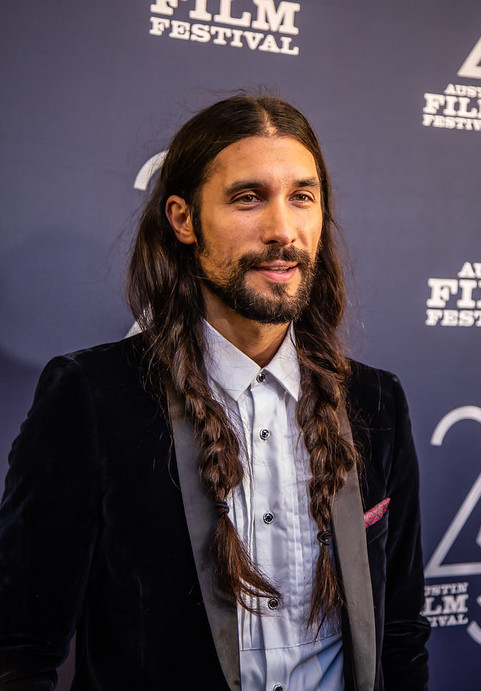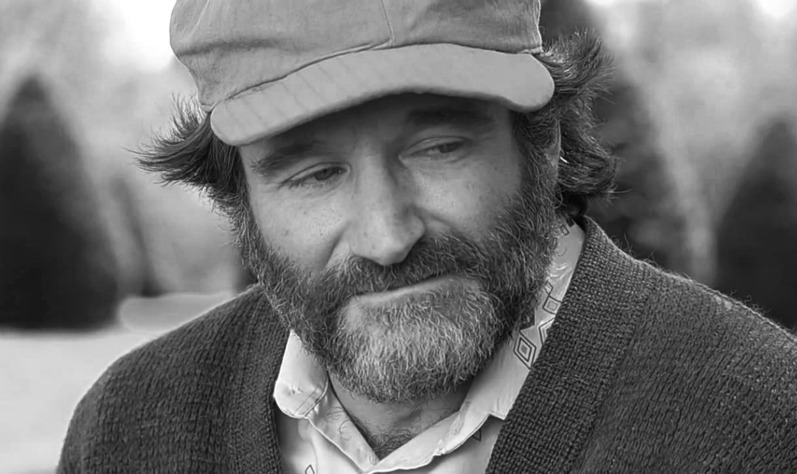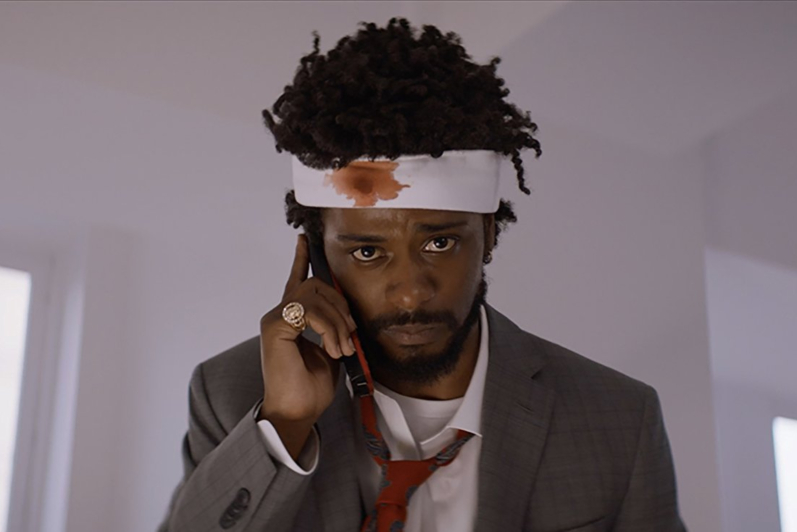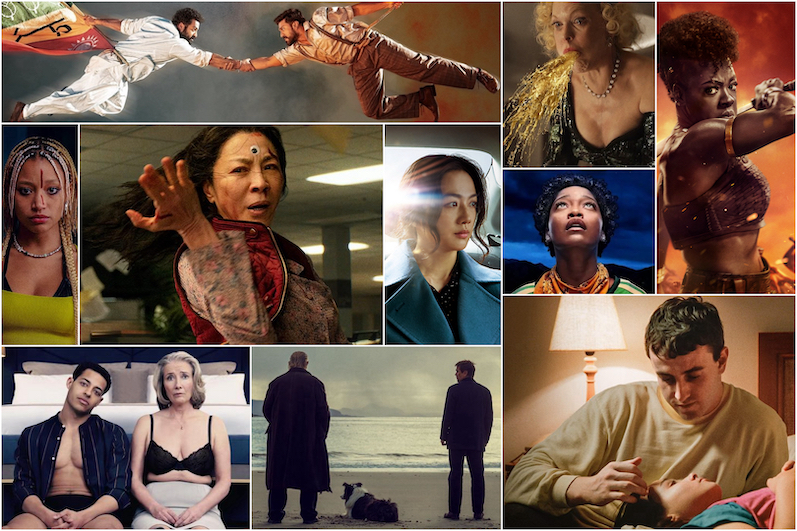In any career field, there’s something to be said about the old-fashioned way of working up through the ranks. Get in at the entry level and gain experience in different aspects of the business before making your way to a leadership position. In terms of film production, this usually means starting as a PA before (eventually… maybe…) taking the reins as a director. That’s the path that filmmaker JASON NOTO took on his way from production assistant to various crew positions to screenwriter, producer, and director. With some award-winning short films under his belt and work as a screenwriter-for-hire, Noto set his sights on his feature directorial debut.
That film, the mystery-thriller BEYOND THE NIGHT, centers on Ray (Zane Holtz), a soldier who returns stateside to mourn the sudden death of his wife and reconnect with his young son (Azhy Robertson). When he brings the boy to his rural hometown in coal-mining country, the child begins to showcase psychic memories of a local girl who mysteriously disappeared years before. Tammy Blanchard, Chance Kelly, and Neal Huff co-star in the film, which had its world premiere at the 2018 Woodstock Film Festival before screening at the 2018 Austin Film Festival. Beyond the Night is being released by Breaking Glass Pictures in select theaters on January 11.
We spoke with writer/director Jason Noto about his film set experience, shooting in a small town, and casting young talent (after all, he is the filmmaker who gave Timothée Chalamet his first role!).
——
COLIN McCORMACK: How did you get your start as a filmmaker?
JASON NOTO: I worked on sets for many years and while I worked on film sets I was writing on my own time. Ultimately, I went from working on film sets to getting some of my writing produced and then transitioned from screenwriting to getting one of my personal projects produced as a director. That kind of spanned over about 12 years.
CM: When you were working on sets, were you formally or informally shadowing the directors of the things you worked on?
JN: No. I come from a blue-collar background, so I kind of just worked up the ranks and was working first as a PA, then as a grip, then as electric, then as a production designer, and then I started producing a bit. I didn’t specifically shadow directors, but I definitely was working on sets absorbing everyone’s position, including the director, so kind of [shadowing] from the side.
CM: Do you think having experience in those different crew positions has influenced the way you work with your crew as a director?
JN: 100%. I think it was invaluable; I never would do it any other way. It was exactly what I think everyone should do, to be honest. Because you really get a grasp of everyone’s role and you can understand everyone’s position. You can really find some empathy for each person’s position, if that makes sense.
CM: When it came time to make your first feature, did you know you wanted to direct a feature for your next project or was that dictated by the story of Beyond the Night needing that longer runtime to tell properly?
JN: Since I’ve worked as a contracted screenwriter for some time now and I’ve had films produced as a writer and just not as a director, continuously my pursuit was to direct my own content. Beyond the Night I always had in mind to write as a feature and my goal is universally to always write and direct, so I definitely was dead-set on directing it.
CM: Was there any resistance since it was your first feature, or were the producers you were working with on-board with you coming on as director and not just the writer?
JN: Because I’ve worked with my lead producer Robin Garvick for so long – she’s been such a champion of my work – we did it together so she definitely didn’t have any questions surrounding that. So my immediate team was very supportive, but I definitely got some backlash throughout the process, from casting to locations, and a lot of the stuff that is obviously very crucial. There’s just a lot of having to gain trust as supposed to it already being there, so yeah it was difficult. That was one of the more challenging things that I hadn’t anticipated. You have to prove yourself as opposed to just being accepted.
CM: For the casting, were you finding that certain actors or their representatives were hesitant about working for a first-time director?
JN: Yeah, very much. I found some hesitation, and also including the budget because the budget wasn’t that large. So the combination of a first-time director and what would be considered a low-budget film, that combination had people a little bit nervous or standoffish. I was grateful ultimately for the cast we got because they were very open and very committed, which at the end of the day is all I could ask for.
CM: In terms of your history as a producer and now as a director, I noticed you produced Erik Weigel’s film El Camino and now he produced Beyond the Night. I was curious about what that working relationship is like in terms of how it differs when one of you is producing and the other is directing and vice-versa?
JN: That’s an interesting topic. Me and Erik have known each other for a long time. We worked together on film sets in different positions earlier on in our careers and we became fast friends. I think because we knew each other personally it has made it much easier to support each other, so if he has something he’s creating that’s a passion project, I can come on and wear that different hat that just involves me coordinating it to happen in more of the technical sense, and allowing him to be as creative as he can possibly be. And then vice-versa. So there’s no competition there, it’s just supporting a friend getting his vision on the screen. That kind of relationship.
CM: How did Adrian Grenier come on board as executive producer of Beyond the Night?
JN: My lead producer Robin Garvick has worked with Adrian for many years and a number of years ago she had introduced us. I was brought on to pen a semi-autobiographical screenplay about Adrian’s childhood and growing up with his mother. We became fast friends through that project as we were working so closely together. Ever since then he’s been interested in my work and my content and that friendship was there. So when Beyond the Night came up, he was very interested in being a part of it, which is great. He was a huge help.
CM: You spoke a little earlier about getting your cast together. With having a child as one of the central characters, was there ever any hesitation on your part because of the restrictions involved with working with minors?
JN: That’s tricky; a lot of people have brought that question up. For whatever reason, I always write stuff with children in it and it’s just something thematically that I’m very attracted to. So a number of short films I’ve done I’ve worked with child actors. I put Timothée Chalamet in his first short film [Butchers Hill] and it’s always been very easy for me. I really appreciate kids for their honesty; they’re way more honest than adults. I find it actually a little bit easier to work with them on set [laughs]. Yeah, it was slightly challenging to cast Azhy Robertson because we had to go through about 40 or 50 kids, but ultimately, I enjoyed the process. And Azhy is a whip. He reminded me so much of Timothée Chalamet in his level of professionalism and his understanding of his surroundings. It was just spot-on. Like if an adult actor opposite him messed up their lines, he would call them out. He was very, very sharp.
CM: Do you find with performers – children or adults – that working with them is case-by-case in how you communicate and interact with them? Or are there similarities in, for example, how you communicated with Timothée Chalamet and Azhy Robertson?
JN: I guess it really depends. That’s one of my favorite things about working with actors is just the human element of it. You’re working with different people and trying to see their vibe and seeing what they need to feel safe and feel like they can really open up and get to the character fastest. Between Timothée and Azhy, they were very similar as far as being so sharp and so focused, so I really ended up just treating both of them like adults and I think they both really responded to that. I didn’t treat Azhy like a kid and that seemed to work well.
CM: You filmed in upstate New York, correct?
JN: Yeah, we shot in Liberty, New York, and Monticello, which are basically next to each other. We did some exteriors in other parts of Sullivan County, but overall we primarily shot in Liberty and Monticello. The film commission there is just beyond kind. They were extremely, extremely kind and very helpful and provided us with endless [support] including police cruisers and the sheriff’s department. It was really great.
CM: Were most of your cast and crew coming in from New York City, or was there a filmmaking or acting community to pull from in Sullivan County as well?
JN: For some background work we brought in some people locally. We did not ultimately cast any speaking roles locally – I may be missing one or two, I’m not 100% sure on that – but overall we brought in individuals from New York and then our lead actor Zane Holtz we brought in from Austin, Texas. Everyone else is New York State, yeah.
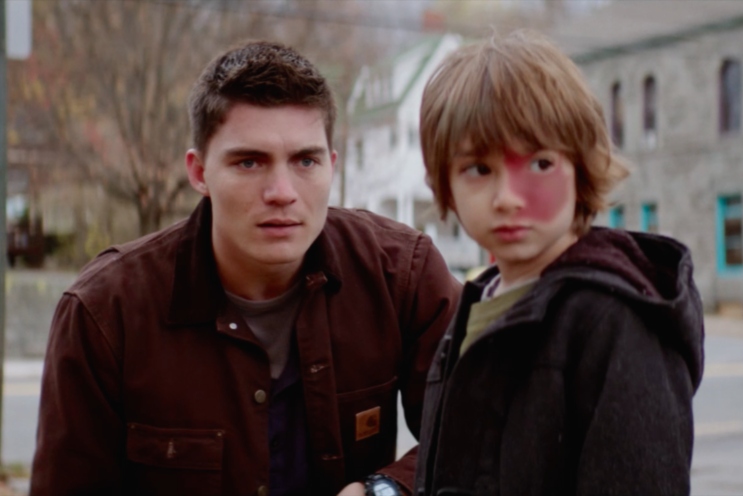
CM: How long was your shooting schedule?
JN: Our shooting schedule was 22 days, and then we had a follow up three-day reshoot.
CM: Were you guys all staying in Sullivan County or were you commuting from the City?
JN: No, I would say 98% of the cast and crew stayed. We all took over the Days Inn in Liberty, New York, and made it our home for – between pre-production and production – probably a month-and-a-half, almost two months. We basically lived out of the Days Inn.
CM: Is there a sense of camaraderie built from that, or on the flip side is there ever a sense of cabin fever that might set in after a certain amount of time?
JN: I think overall, naturally with any crew, there ends up being a sense of camaraderie. Maybe the cabin fever is when it’s a tighter environment, like a house that you’re taking over. But the fact that it was a Days Inn and everyone had their own room – and their own bathroom – I think overall it was pretty solid. Everyone maintained a good attitude. I think everyone having their own bathroom was really valuable [laughs].
CM: In life, that’s a valuable lesson.
JN: Yes. It was good. I think it worked out well with our lead and supporting cast. They stayed there for the duration of the shoot, so they got to know some crewmembers. You find that stride after about the first week of shooting, and we were good. There weren’t any of these hidden drama situations. Everyone was really solid.
CM: The film is set in a coal-mining town. That was inspired by the place where you used to visit your grandmother growing up?
JN: Yeah, I grew up going to a small town called Shamokin, Pennsylvania. It was a coal-mining town of about 60,000 back in the early 1900s, and now it’s down to I think 2,000 people. So it’s a real run-down, kind of forgotten place that was always super fascinating to me going there growing up. It’s just kind of stuck in a time period that doesn’t move and people don’t leave there. Everyone knows everything about everybody. A lot of themes of the film regarding truth were very interesting in that area because it doesn’t matter what is true, it’s just a matter of what everybody believes. I always thought it was super fascinating in that area. It’s kind of wild, it’s still like that now. It’s a really special place to visit.
CM: What was the location scouting process like for you? How long did it take to find the right town and what aspects – aesthetics-wise or practicality-wise – were the most important for you to find?
JN: Originally, I did want to shoot in Pennsylvania and then we had to make the adjustment to upstate New York, which I was totally happy with, but our adjustment limited my location scouting time. So I had about three weeks to basically get in a car and drive around to 60 different towns trying to find the right one. I’m a pretty specific person when it comes to the details and it took a while. It took a while to find a town that still had life in it and had cinematic feeling overall just being there, but also – I don’t know how to say this – but us bringing our production there, I wanted to try to help the town, if that makes sense. I wanted to bring our money there, I wanted to help a town that maybe wasn’t doing as well as the town next to it. We found that in Liberty and we were able to kind of support the town and coexist. There was a symbiotic relationship there. Liberty held that for us, it had that small-town feel and a limited amount of residents, and that small bubble that really made you feel confined. To really capture the feeling that I’m grateful for in the film, which is very small-town and very private.
CM: And they were accommodating to the production maybe because they weren’t flush with cash like a production boom city might have been?
JN: Maybe, that could be. I guess this is all speculation, but for whatever reasons it did land well. Everyone was supportive and everyone was very positive about us shooting there. We had a church scene where we were able to bring in a solid amount of locals – like 50-some locals – and everyone was really positive and excited about it. It was very positive; we didn’t have any New York City-style people barking at us or anything like that [laughs].
CM: The film was shot under the title The Awakening. What went into the decision-making process to change the title?
JN: Honestly, it’s a very simple answer. I had written it originally as The Awakening and it felt in relation to the themes of the film like it landed for me. It seemed very realistic and very correct; some titles just feel right. And then I very quickly learned that there were I think five other films coming out with that title [laughs], and I said, “Okay, this isn’t going to work. We can’t do this.” So I sat and went through writing lists and lists and lists and ultimately, Beyond the Night had a good rhythm to it and it had a lot of meaning and different subtext to it. I was very happy landing with Beyond the Night.
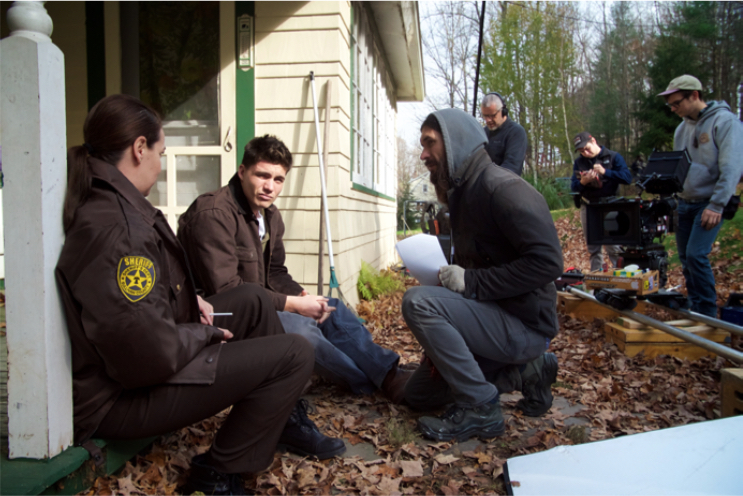
CM: Looking back, you’re an alum of the Berlinale Talent Campus and the Reykjavik Talent Lab. What did those experiences teach you that you were able to bring to your filmmaking work since?
JN: Certainly those [labs] specifically, but in general and even including the success I’ve had at previous festivals with short films, I think ultimately I learned more about myself by going to these places. I work as a screenwriter primarily right now, and it’s a very individual job. There’s not a lot of camaraderie, there’s not a lot of interaction, so it’s easy for me to question myself, question my ability, question my position. Going to these places like Berlinale, it supported my beliefs that I belong there, I belong in the industry, I know what I’m doing and I’m good at my craft. It almost gave me a sense of confidence, I think, that I belong there. As opposed to me going there and thinking, What am I doing here? It reiterated my belief in the position that I’m in.
CM: Diminished some “imposter syndrome” maybe?
JN: Yeah, you know, I think that naturally comes into play in a position where I’m primarily working alone. I’m convincing myself of things – or not convincing myself of things. So I think it ends up being very positive to just get out and be around other individuals, be around competition, and measuring yourself against other work and other peoples’ thoughts and other peoples’ projects.
CM: To wrap things up, what’s next for you?
JN: I wrote a project before Beyond the Night that I am very excited about. It’s a larger project, and naturally, it was very difficult to find support for that project because I hadn’t had a track record. I’m very grateful that with the early success and response from Beyond the Night, I found some really powerful interest in this project. So I am in the early stages of this next project, which I’m really, really excited about.
__
Thanks to Jason for talking to us about BEYOND THE NIGHT. Learn more about the film at the Breaking Glass Pictures website, or follow the movie on Facebook, Twitter, or Instagram.
If you’re an independent filmmaker or know of an independent film-related topic we should write about, email blogadmin@sagindie.org for consideration.

